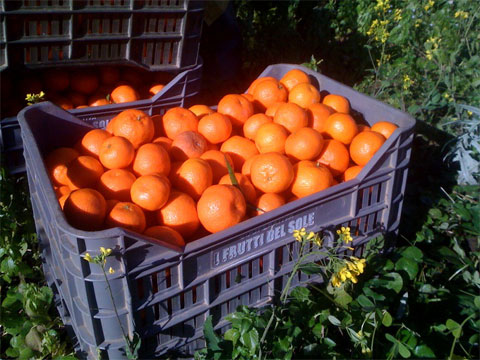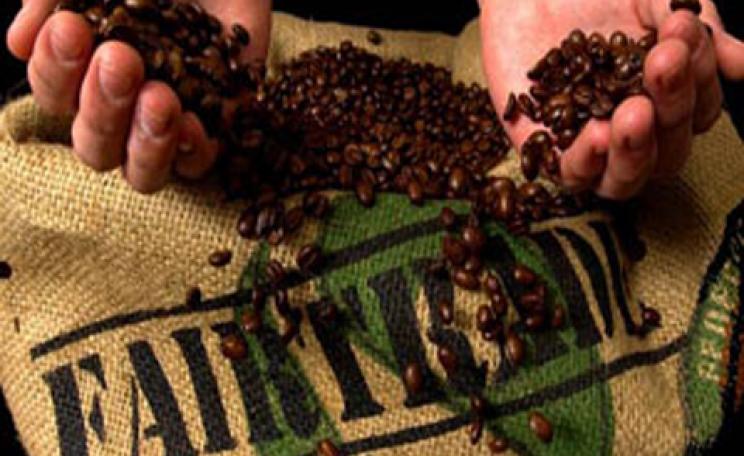Campaigners are calling on supermarkets to clean up their banana supply chains
Like many young Dominicans, Federico left for the US when he finished school to look for work, ending up in a Spanish store in New York. After 20 years working seven days a week he grew tired of the long hours and yearned for his homeland and the tropical climate of the Caribbean.
He had heard about the booming banana trade with the export market growing fast, a cheap and plentiful workforce, and land and water in abundance. It seemed like an ideal opportunity, with money to be made for entrepreneurs willing to set up a plantation. Today he is half way towards his dream, 35 hectares of indigenous forest have been cleared with half already planted with banana trees. The other half will be up and running later this year, together with a new building to wash and pack the harvested bananas.
Not far away Jan Luis Moneta is still waiting for his dream: a work visa. He migrated from Haiti, one of the poorest countries in the world, when he was 14 years old. After 30 years working on banana plantations he is still classed as an illegal worker. With his daily wage he cannot afford to live in anything more than a corrugated iron hut, with no water, toilet facilities or electricity.
Jan Luis is just one of many thousands of 'invisible' Haitian migrants working in the banana sector, where they make up an estimated 90 per cent of the total workforce [the government says the figure is 66 per cent]. Union activists told the Ecologist that 90-95 per cent of them are working in the country illegally.
Although their stories are wildly different, both Federico and Jan Luis have together helped fuel the Dominican Republic's banana boom. The country is the UK's biggest supplier in value terms, with more than half of all their bananas exported to our shores. The majority of these are Fairtrade and/or organic. Despite the economic downturn, overall Fairtrade sales in the UK grew by 12 per cent in 2011.
But by buying organic and Fairtrade bananas, are consumers in the UK helping to improve conditions for workers and the environment on the ground? And is the switch to organic and Fairtrade providing a template for other banana-producing countries to replicate?
A favourite at breakfast and in packed lunches, the banana's unrivalled popularity has seen major supermarkets such as Tesco and Asda vying to offer the best deal. Between 2002 and 2008, a price war between major supermarkets saw the price of bananas plummet by up to 41 per cent.The price cuts are almost invariably kicked off by walmart (owner of Asda in the UK) and have continued to this day. At one point in 2009, German discounter Aldi led others down to the UK's lowest price ever, at 37p per kilo, one third the price at the beginning of the decade.
A decision by Sainsburys and Waitrose to only source Fairtrade bananas from 2007 seemed to signal a change or at least a part change. In 2012 the Co-op followed suit. These decisions have contributed to creating a £150 million Fairtrade banana market, accounting for one in every three bananas sold.
The Dominican Republic has been one the main beneficiaries of this boom. Its Fairtrade and organic banana industry has been growing rapidly over the past decade with an estimated 60 per cent of banana production certified organic and a quarter certified Fairtrade.
The principles of organic farming insist on fairness to all workers, while Fairtrade standards are meant to ensure fair payments to banana plantation owners and their workers, with the additional Fairtrade premium being spent on projects to help small producers and plantation workers.
While the health problems normally associated with banana plantations and daily contact with toxic pesticides and fungacides were not apparent in the Dominican Republic, the industry the Ecologist saw in the country was still one reliant on a migrant workforce paid poverty wages, living in slums and with no legal status. What's more, in an effort to tackle criticism of its treatment of illegal workers, the Dominican Republic government is now planning to force many of these migrants underpinning the banana industry to leave the country.
The organic and Fairtrade boom
The seeds of an organic, and latterly, Fairtrade industry in the Dominican Republic were sown in the 1980s when private foundations from Germany encouraged organic cocoa production. Producers later switched to bananas. Growing consumer demand, together with technical support from multinational marketing companies, helped the banana sector grow considerably from the 1990s onwards.
The organic farms we visited had managed to replace often dangerous chemicals used to protect banana trees with a natural pesticide, a mixture of garlic and rotting vegetables. But the prevalence of black sigatoka (or 'leaf streak'), the fungal disease that wreaks havoc in banana growing countries across the world, is becoming a major problem, with farms regularly reporting losses of up to 30 per cent of their crop. The disease attacks the tree and can cut fruit production by half.
A particularly devastating outbreak in late 2011 wiped out an estimated 40 per cent of production in the main banana growing region. For smaller producers in particular, the growing prevalence of diseases like black sigatoka make it a struggle to meet the low and non-chemical requirement in Fairtrade and organic standards. Larger conventional and organic farms in the country can afford to operate aerial spraying every 20 to 30 days to protect their crops.
Federico runs an organic plantation in the north-west of the Dominican Republic in the province of Monte Cristi. Like many organic farms he hopes to get Fairtrade certification soon too. Along with the neighbouring province of Valverde, this is the heart of the banana-growing industry in the country. One government official we spoke to estimated 90 per cent of employment here is related to bananas.
On his farm, Federico is proud of his chemical-free plantation, even as it expands onto more former forested land. The irony is that forested land can be converted straight into organic production whereas former conventional agricultural land would have to go through a two-year conversion period to remove traces of chemicals in the soils.
He uses a mixture of roots and chicken manure to fertilise the plants, which means he loses out on the unnaturally large bananas of conventional farms. 'My smaller bananas are much healthier and stronger', says Federico. Like all other plantations, every bunch of bananas is protected by a plastic bag, although in his case dipped in a mixture of hot pepper, garlic and soap rather than chemicals.
The use of plastic bags in particular is one of the most wasteful parts of banana production. On both conventional and organic farms, they are used to protect the bananas from over-exposure to the sun and thrown out after three months. Disposal of the bags is badly regulated and local roads and rivers throughout the banana growing regions are strewn with plastic waste, white bags from organic plantations and blue chemical coated bags from the conventional ones.
Ironically, if it wasn't for the colour coded plastic bags covering the bunches of bananas, it would be impossible to spot the difference between the organic and conventional farms. They often lie just metres apart (sometimes even on the same farm) and look identical in terms of layout, stretching for tens of acres with no attempt at mixed cropping or diversity to encourage natural wildlife. The monoculture landscape is little different to the oil palm plantations of south-east Asia which have devastated the once biodiversity-rich tropical rainforests of countries like Malaysia and Indonesia.
'This region has lost its biodiversity,' says Fasto Pena, director of Naturaleza, a local environmental group. 'It's equally bad on organic and conventional farms. Plantation owners need to look after the natural environment better so it is still there for us in the future.'
The forgotten banana workers
There is also a less visible side to banana production. As with the majority of banana growing countries, a key component of the growth in the Dominican Republic has been a cheap migrant workforce. When the Haiti earthquake struck in 2010, thousands fled across the border, ending up in the north-west banana-growing states. However, the supply of migrant workers has actually been constant for the past 20 to 30 years. But a better life is unlikely to be found on a banana plantation.
Lying hidden off a main road, around 1,000 Haitian migrants live crowded together in a community of corrugated iron shacks. Most of them are young and male, some have families but no-one has water, toilets or electricity. Some of them have jobs. Some don't. Of the ones that do, nearly all work on banana plantations, including some for a well-known organic plantation.
Most of the workers get 250 to 300 pesos a day when they work (about £4). 'It is barely enough to eat,' a group of young men tell us. 'It allows us one meal a day of beans and rice but is not enough to rent a house or look after a family.'
Nearby, off a main road near the town of Mao in Valverde, in another community of mainly wooden huts, live around 130 Haitian migrants. One of them, a 34-year-old Haitian Sabin James, told us he works on an organic plantation and after 15 years in the country is still trying to get legal status. Even though he gets paid 300 pesos, Sabin can't afford to buy a US$225 (8,800 pesos) passport that would give him access to social security. His company offers help to apply for one but won't help him pay for it. 'They say they are helping us but they know it's no help at all,' says Sabin.
'The companies don't want to know about workers or bother themselves with how much they earn, where they live or what they eat,' says Padre Regino Martinez, co-founder of Asomilin.
His organisation has been helping migrants get passports at a reduced cost of US$140 and overcoming their fears of being deported if they try and apply.
Padre says Dominican workers don't get paid more but were given fixed contracts and the opportunity for promotion to higher paid positions, which Haitians never occupied, leaving them trapped in poverty.
'They don't have enough to cover the costs of living. And have no way of getting a higher salary to rent a home or buy a visa or passport. No power to negotiate with plantation owners. There are plenty of workers who need a job, so they are all too scared to stand up to employers,' says Padre.
Another migrant, Emmantel Audige was one of a number of workers we met living near the Haitian border and is employed on a Fairtrade certified banana plantation. He told us that he and other migrants had signed a contract for eight hours a day but actually worked six am to five pm without rest or overtime and for wages of no more than the average 250 pesos reported by non-Fairtrade workers. He said he had been in the country for 11 years but was still an illegal worker, with no rights to social security. All migrants can use state hospitals but we were told care was very poor, with long waiting times.
According to the Fairtrade Foundation the premium consumers pay for Fairtrade bananas has been used to help migrants get passports and working visas, however, Emmantel says he has no idea what the premium gets spent on. He and other migrants would like to have access to a healthcare centre to deal with work injuries and for use by their families. After one year workers should also get 14 days paid holiday but Emmantel says he gets none.
Even migrants like Jean Baptiste who has been working in the country in the banana sector for over 30 years - currently six days a week for an organic and Fairtrade certified plantation - are still forced to live in the community of wooden huts with no electricity, water or toilet facilities. Jan gets 280 pesos a day but says a fair wage would be 500 pesos (£8), something that would allow him to continue to live comfortably in the wooden huts with fellow migrants, but not enough to rent a home with water and electricity.
Back on his organic farm, Federico, who hopes to be certified Fairtrade, admits that some of his workers are illegal migrants with no work permits. He uses around 40 workers on day-to-day contracts, although he is not sure about where they live or their living conditions. He says his farm does not have enough money yet to help workers get visas or passports.
The Fairtrade Foundation in the UK acknowledges that migrant workers in Dominican Republic's banana industry need help in getting better housing, access to healthcare and legal status. It says many of the small-scale producers are often disadvantaged themselves and it takes time for them to assume more responsibility for the living conditions of migrant workers.
Trade union groups in the Dominican Republic say Fairtrade standards do not do enough to help migrant workers. 'There is no doubt that they are improving international trade but it isn't helping migrant workers to earn a fair salary,' says Luciano Robles, from the Trade Union Autonomous Federation (CASC). 'International standards need to be adapted to local situations.'
Supermarket price wars
The Fairtrade Foundation says calls for using the Fairtrade premium to subsidise migrant workers' wages may undermine the responsibility of farm owners and employers to tackle the 'living wage' issue. It points the blame, in part, at the continual use of bananas in price wars between supermarkets, saying it has devalued the fruit in the eyes of the consumer and left producers with low returns, even in the Fairtrade sector, which has to remain competitive against conventional alternatives. Although the minimum price for Fairtrade bananas has risen slightly in the past two years, the price wars make it harder than ever to improve the conditions of slum-dwelling Haitian migrants.
Campaigners are hoping the new supermarket watchdog, the Groceries Code Adjudicator, will help stop supermarkets pressurising their suppliers. 'Supermarkets are the most powerful actors along supply chains and make vast profits however the unsustainably low prices they pay to suppliers can leave the workers who plant, harvest and pack our food in poverty,' says Banana Link campaigner Anna Cooper.

While campaigners fight for a better standard of living for banana workers, there are fears many of the illegal Haitian migrants could soon be expelled. Tough new rules, which union groups say are politically motivated, state that at least 80 per cent of a firm's employees must be Dominican - a figure at odds with the reality of the migrant-dominated banana industry. Government officials told the Ecologist this was to 'regularise' the workforce and ensure Haitians were legal citizens in the country. But it puts the plight of thousands of other illegal migrants in peril.
'Until now the Dominican Republic government has allowed the existence of illegal Haitian workers, knowing the extreme difficulties they face in their own country and which can be partly solved by work here,' says Marike de Pena, from Banelino, a well-known Fairtrade producer group that sells bananas to many UK supermarkets.
She admits some of their small-scale producers may be using illegal workers but says the group wants more Haitian migrants to be able to stay in the country and get better wages and legal status. To that end, the Fairtrade Foundation, together with banana producers, have been lobbying the government to resolve the issue.
For now though, the difficulties for many migrants persist. 'The network of migration, exploitation and violation of rights is mutually beneficial for Haiti and Dominican Republic. There is even money to be made on the border from trafficking people. The institutions issuing visas, the Dominican economy and the banana industry getting cheap labour. Everyone benefits,' union organiser Luciano Robles told the Ecologist.
Take action:
Take action to stop supermarkets abusing their buyer power, paying unsustainably low prices to their fruit suppliers and forcing plantation workers to live in poverty. Sign the Make Fruit Fair! petition now to call on the EU to regulate supermarket buyer power
http://stopsupermarkets.makefruitfair.org.uk/
Useful links:
Stop supermarkets - make fruit fair
Fairtrade Foundation UK
| READ MORE... | |
 |
COMMENT Special report Who is picking our food? In a major investigation the Ecologist reports on the hidden stories behind those harvesting the fruit and vegetables - and other staples - we eat everyday, both in the UK and internationally |
 |
NEWS ANALYSIS Special report Milk: why the white stuff leaves a bad taste in the mouth Tom Levitt reports on the serious environmental and animal welfare problems associated with the UK dairy sector |
 |
COMMENT Special report What's really in your cuppa? The British cuppa is an institution. But how many of us have actually wondered what goes into our favourite drink, or where the principal ingredients come from? |
 |
NEWS ANALYSIS News investigation Coca Cola challenged over orange harvest linked to 'exploitation and squalor' The manufacturer of Fanta is being urged to help address the poor conditions and low wages endured by some African migrant workers harvesting oranges in southern Italy. |
 |
NEWS ANALYSIS News investigation Scandal of the 'tomato slaves' harvesting crop exported to UK Across Italy an invisible army of migrant workers harvests tomatoes destined for our dinner plates. Paid poverty wages and living in squalor, medical charities have described conditions as 'hell'. |








